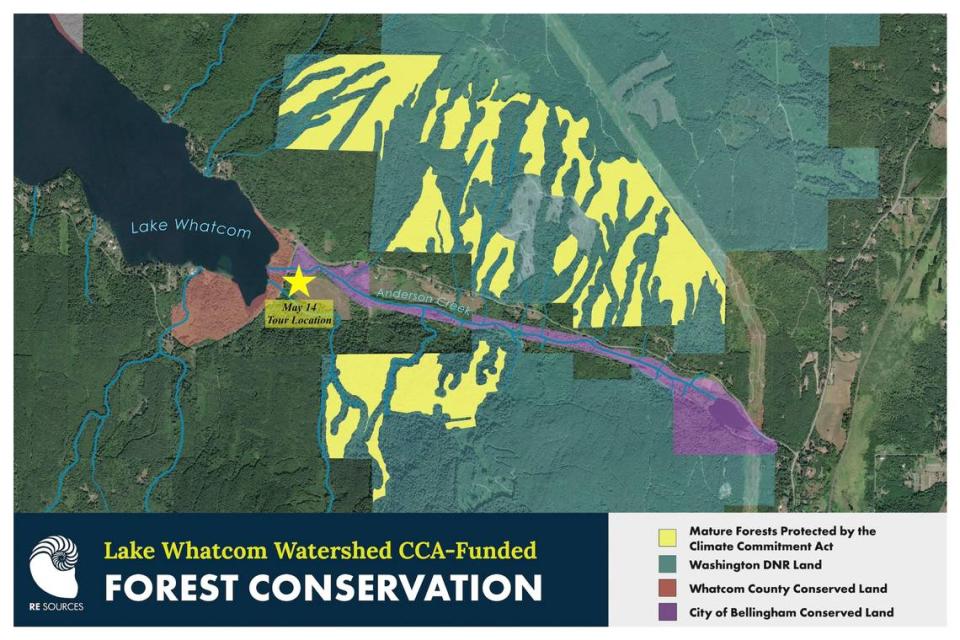Gov. Inslee touts benefits of Climate Commitment Act in visit to Lake Whatcom preservation site
- Oops!Something went wrong.Please try again later.
Gov. Jay Inslee visited a forested site above the south end of Lake Whatcom on Tuesday, praising state and local officials for their efforts to fight climate change through land preservation.
Calling trees a “carbon-sequestration machine,” Inslee touted his signature Climate Commitment Act, a 2021 measure that’s raised billions to fight human-caused climate change through a “cap-and-invest” program where major polluters must buy allowances to cover their emissions.
That landmark climate legislation is now the focus of a repeal effort that will be on the November ballot.
Speaking to about 30 reporters, state and local government officials, tribal members and environmental advocates in a clearing below 600 wooded acres in the Mount Baker foothills, Inslee discussed how preserving timberland is part of the state’s multi-faceted effort to reduce greenhouse gas emissions. That land was purchased by the state Department of Natural Resources with funding from the Climate Commitment Act and is being preserved from logging forever.
“There’s two parts to this act,” Inslee said. “We’re seeing the investment side here, but the side that prevents pollution in the fundamental cap is really important, too. That’s protecting these forests and this lake as well. We’re taking care of this Garden of Eden in two different ways.”
Older forests such as the one being preserved provide habitat for a diversity of plants and animals and are also more resistant to wildfire, Inslee said.
“If we preserve our trees, it can help other (trees) from not burning down and it can prevent forest fire smoke from getting into our kids’ lungs,” Inslee said.
Inslee said that his visit shouldn’t be considered a political event, and he described several ways that the Climate Commitment Act is making a difference in Washington residents’ lives, including:
▪ A nursing home that was able to add a heat pump, keeping its residents cool in summer and allowing them greater control over individual room temperature.
▪ An electric school bus driver who said his young passengers are less rambunctious because they don’t have to holler over the sound of a diesel engine.
▪ Single mothers who now can afford to lease an electric car.
“(The Climate Commitment Act) has value independent of any electoral or ballot issue. It’s not an abstraction. It’s reality,” Inslee said.

Csenka Favorini-Csorba, policy director for the state Department of Natural Resources, said that preservation of mature forests is key to fighting climate change. Some $70 million has been set aside for that purpose statewide, Favorini-Csorba said.
“The Climate Commitment Act has been amazing in terms of funding for the DNR,” she said.
Whatcom County hopes to expand its role in protecting complex forest ecosystems, Deputy Whatcom County Executive Kayla Schott-Bresler told The Bellingham Herald in an email.
“We hope to further work with DNR to identify and acquire replacement lands so we can maintain our working land base. We are also actively working with partners on forest management planning for the Lake Whatcom watershed as we look to secure the health and future of the Lake Whatcom reconveyance lands,” Schott-Bresler said.
Inslee praised Bellingham Mayor Kim Lund for her city’s efforts to buy land in the Lake Whatcom watershed and preserve it from development.
“The city shares in the commitment,” Lund told the crowd, adding that since 2001, the city has spent $45.2 million to buy 2,786 acres of land that stopped the construction of about 900 homes or other buildings.
Lake Whatcom is the drinking water source for 100,000 Whatcom County residents, including Bellingham and the community of Sudden Valley.
Water customers pay a surcharge that funds the program.

